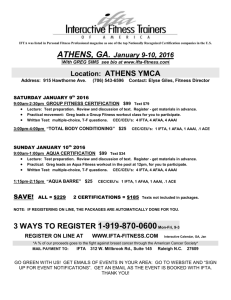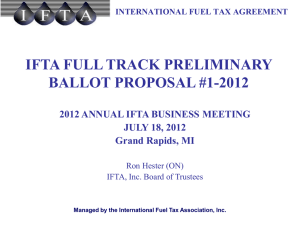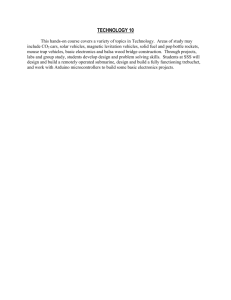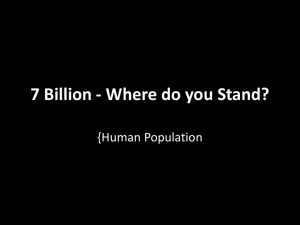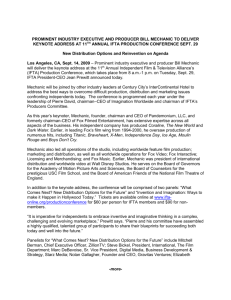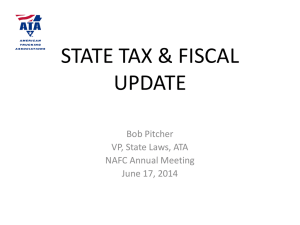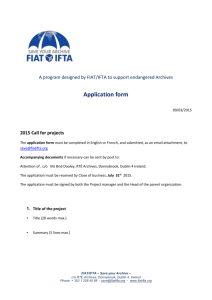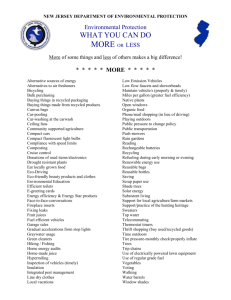Summary of Amicus Curie Brief
advertisement
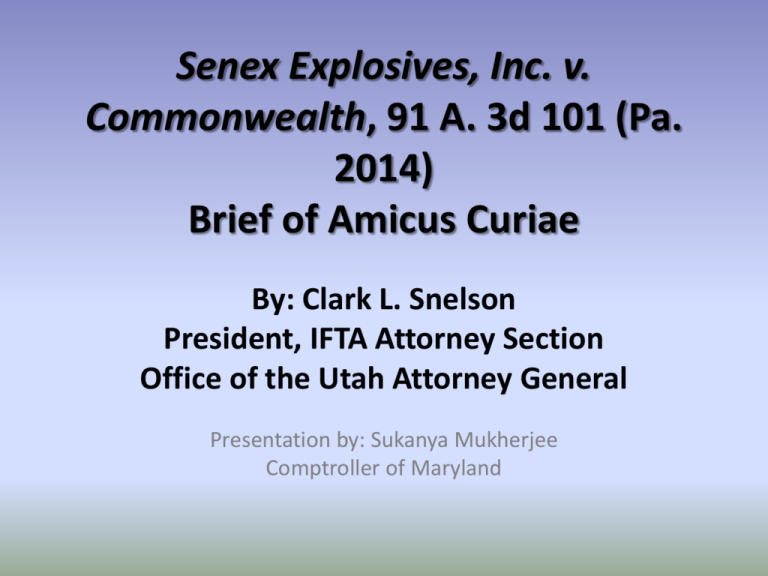
Senex Explosives, Inc. v. Commonwealth, 91 A. 3d 101 (Pa. 2014) Brief of Amicus Curiae By: Clark L. Snelson President, IFTA Attorney Section Office of the Utah Attorney General Presentation by: Sukanya Mukherjee Comptroller of Maryland Summary of Questions Presented • Commonwealth Court erred in holding that vehicles exempt under Pennsylvania Code 75 Pa. C.S. § 2105(a)(7) are also exempt under IFTA. • The Commonwealth Court erred in finding that the definition of special mobile equipment under Pennsylvania Code 75 Pa. C.S. § 102 and the definition of qualified motor vehicle under IFTA were mutually exclusive. Summary of Argument • Senex elected to meet its fuel tax requirements in all jurisdictions using PA as its base state, and by also electing to include the 14 disputed vehicles licensed as special mobile equipment in PA in its IFTA fleet, Sensex obligated itself to report all miles traveled and fuel used by the disputed vehicles whether PA would independently require those vehicles to report and regardless of whether those miles would be subject to tax. Arguments • I. Placing IFTA Decals on Vehicles Carries Consequences that Impact All IFTA Jurisdictions: • Commonwealth Court concluded that vehicles were exempt from IFTA by virtue of PA law, despite the fact that vehicles were credentialed to travel in all 58 IFTA jurisdictions. This granted an exemption by PA beyond its border to all IFTA jurisdictions in contravention of the terms of the IFTA agreement. • Three core concepts at the heart of IFTA: – (1) base state concept – (2) the retention of each jurisdiction’s sovereign authority to determine its own tax rates and exemptions – (3) the definition of a qualified motor vehicle • IFTA Articles of Agreement, Article 1, § R.130.100 Arguments • A. The Base State Concept Requires Reporting of All Vehicles in the Fleet: • By filing in its base state, Senex satisfied its fuel use tax liability in all 58 jurisdictions. Senex has voluntarily undertaken, its reporting all miles traveled by all vehicles in the IFTA fleet. Additionally, Senex voluntarily placed credentials on the disputed vehicles, thereby making them part of the IFTA fleet • Reporting miles traveled and fuel consumed makes it possible to calculate MPG. • Taxable miles traveled in each jurisdiction divided by the fleet MPG yields jurisdictional fuel used, multiplied by the jurisdictional rate yields the tax due. Arguments • Base concept is compromised by allowing the disputed vehicles to be exempt from IFTA, including all the reporting requirements. • All participating jurisdictions rely on the reports filed with the base state to accurately calculate fuel used and tax liability in their respective jurisdictions. • The Commonwealth Court’s determination that the vehicles are exempt in PA and are also exempt from IFTA, threatens to undermine the base state concept Arguments • B. Each Jurisdiction Retains Sovereign Authority to Determine Its Own Exemptions: • The effect of the Commonwealth Court’s decision is to export the effect of that exemption to all participating IFTA jurisdictions. Pennsylvania has thus extended it’s reach through its valid exemption and infringed on the sovereignty of those jurisdictions • By placing IFTA decals on its vehicles and include those vehicles in its IFTA fleet, Senex obtained the right to travel in all 58 jurisdictions without having to obtain temporary fuel use permits. Senex waived the statutory right granted by Pennsylvania to not report those vehicles by voluntarily choosing to place those vehicles in its IFTA fleet. Arguments • Pennsylvania courts have the full authority to interpret and apply Pennsylvania law and to determine whether or not the fuel used by special mobile equipment in Pennsylvania is subject to tax. However, the legislatures of the 57 other jurisdictions which are signatories to the IFTA agreement retain their rights to determine their own exemptions. Arguments • C. The Definitions of Qualified Motor Vehicles are not Mutually Exclusive: • Regardless of how jurisdictions choose to exercise their authority to determine exempt vehicles or exempt fuel use, that any vehicle which meets the IFTA definition of qualified motor vehicle or are declared to be qualified motor vehicles by the licensee, report all their miles traveled and fuel consumed “until such time as the decal becomes expired or the vehicle is no longer under the licensees authority.” – IFTA Articles of Agreement, Article VIII, § R.840 and IFTA Procedures Manual § P. 710 Conclusion • By participating in IFTA, a carrier can meet its fuel use obligation within 58 jurisdictions with a single filing. By electing to place vehicles in the IFTA fleet, a carrier opens the doors of all of those jurisdictions to travel without obtaining fuel use permits. • In return, the carrier agrees to report all miles traveled and fuel used by those vehicles and keep records which all the base jurisdiction to determine each state’s liability and to collect and remit taxes for each jurisdiction. • Participating jurisdictions retain their sovereign authority to determine their own tax rates and their own exemptions. • Pennsylvania is free to determine the effect of its exemption on Pennsylvania’s liability. Conclusion • Pennsylvania can fully exempt the miles traveled by those vehicles in Pennsylvania without exempting those vehicles from IFTA and while still requiring reporting of the vehicles as contemplated under the IFTA Agreement.
